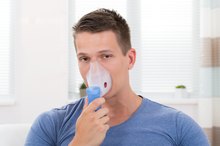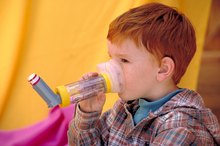What Are the Dangers of Using a Nebulizer?
Though nebulizers can be beneficial in treating respiratory diseases, they can also be dangerous. Overuse can lead to cardiac and nervous system issues and cause the patient to become psychologically dependent. There are dangers of the nebulizer falling into the hands of teenagers who will use it to inhale alcohol. Also, if you do not properly clean your nebulizer it will attract bacteria and mold and could lead to more respiratory infections.
If you are experiencing serious medical symptoms, seek emergency treatment immediately.
Nebulizer Defined
A nebulizer is a small electronic air compressor that takes liquid medication and turns it into a mist, which is then sent up a long tube into a face mask. The receiver of the medication inhales the foglike substance into his lungs. The breathing session can take upwards of 10 minutes to complete.
Uses of a Nebulizer
What Is the Difference Between a Nebulizer & Atomizer?
Learn More
The main use of nebulizers is to deliver inhalant medication for respiratory diseases to those too young or too weak to use an inhaler. Small children tend to have a difficult time breathing in deeply when using inhalers, or they breathe at the wrong time and do not get enough medication in their lungs. Likewise, if you have full lungs and are unable to breathe deeply, a nebulizer helps to deliver the medication in smaller particles than those of an inhaler.
- The main use of nebulizers is to deliver inhalant medication for respiratory diseases to those too young or too weak to use an inhaler.
- Likewise, if you have full lungs and are unable to breathe deeply, a nebulizer helps to deliver the medication in smaller particles than those of an inhaler.
Psychological Dependence
Some patients who use nebulizers for asthma or other chronic respiratory diseases become psychologically dependent on their nebulizers 2. These sufferers tend to abstain from going places where they could not bring or use their nebulizer, should they have trouble breathing.
That being said, the invention of the hand-held nebulizer has made it easier for some individuals to enjoy more activities because they have a portable nebulizer available should they need it.
Infection
Purpose of Nebulizers
Learn More
The face mask apparatus should be taken apart and washed with soap and hot water after each use, then allowed to drip dry on a clean surface. Nebulizers are prone to collect bacteria and mold because the machine emits a liquid mist. Because you are inhaling the medication and any germs that might be on the mask, the nebulizer might actually cause a respiratory infection.
- The face mask apparatus should be taken apart and washed with soap and hot water after each use, then allowed to drip dry on a clean surface.
- Nebulizers are prone to collect bacteria and mold because the machine emits a liquid mist.
Alcohol Tool
Because a nebulizer essentially turns medication into a mist where it is inhaled and finds your blood stream almost instantly, many teenagers are beginning to use these machines to turn alcohol into a mist and thus, feel the effect much faster than they would when drinking alcohol. Since the effect happens so quickly, it is easy for teens to end up with alcohol poisoning.
Overmedicate
When administering medication is your responsibility, it is easy to overmedicate if you do not follow instructions. With a nebulizer, your doctor may ask you to use it whenever your lungs are feeling full. However, some patients tend to overmedicate, using the medication in the nebulizer as a preventative drug rather than a rescue drug. This is commonly seen in patients with asthma who use Albuterol, a bronchial dilator, in their nebulizers. Overuse of Albuterol in nebulizers can lead to cardiac and central nervous system issues like hypertension, nervousness, dizziness and rapid pulse.
- When administering medication is your responsibility, it is easy to overmedicate if you do not follow instructions.
- This is commonly seen in patients with asthma who use Albuterol, a bronchial dilator, in their nebulizers.
Related Articles
References
- Almost a Doctor: Skills and Procedures: Using Nebulizer
- Every Day Health: Asthma: Nebulizers for Asthma Treatment
- NHLBI Guidelines for the Diagnosis and Treatment of Asthma. Expert panel report 3: guidelines for the diagnosis and management of asthma.
- Biddiscombe, Martyn. (2017). Inhaler characteristics in asthma. European Respiratory & Pulmonary Diseases. 03. 32. doi:10.17925/ERPD.2017.03.01.32.
- The Cleveland Clinic. Home nebulizer instructions.
- American Academy of Allergy Asthma & Immunology. Tips to remember: inhaled asthma medications.








